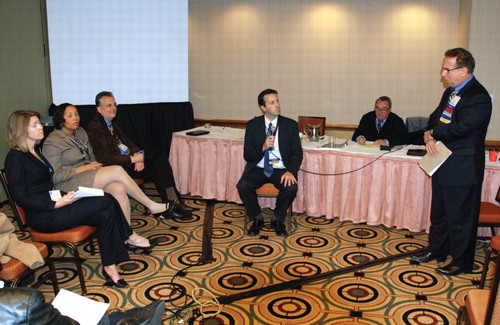Assessing Youth Competence Requires Multistage Process
Determining when children and adolescents are competent to stand trial is a job that places extra levels of demands on forensic psychiatrists, an expert panel said at the annual meeting of the American Academy of Child and Adolescent Psychiatry in Chicago in October.
Merely applying to young people the methods used to decide competency for adults isn't enough, said Christopher Thomas, M.D., of the University of Texas Medical Branch at Galveston.
“Competency rulings in adult courts are based on 'mental impairment,' not developmental capacity,” he said. “There are no uniform legal standards to assess juveniles, since they depend on the jurisdiction or even the crime involved.”
For instance, an adolescent judged competent to stand trial for breaking and entering might not be considered competent if the charge were murder, he explained. Rules vary from state to state, as does funding allocated for training forensic psychiatrists or psychologists and for any follow-up oversight for the children.
Competency is usually raised by the defense, but the judge or prosecutor may also do so.
“The assumption is that the youth is competent to stand trial,” said panelist Louis Kraus, M.D., of Rush University Medical Center. “The burden is on the defense to demonstrate incompetence.”
Competency in general is the ability of a defendant to understand and appreciate the situation in the courtroom, to manipulate information, and to make or communicate a choice, said Brian Zimnitsky, M.D., a forensic psychiatrist affiliated with Johns Hopkins University and the University of Maryland School of Medicine in Baltimore.
Competency is important both because it is a matter of general fairness and because it derives from English common law and from the Fifth Amendment to the U.S. Constitution, he said. The defendant must understand the charges he or she faces and what roles the judge, prosecutor, and defense attorney play. A juvenile or a person with developmental disabilities may know some of these things on some level, but have a lesser ability to weigh different possible outcomes.
“They can't put information to use to participate in their defense,” said Zimnitsky.
The key to competency criteria lies in the 1960 Supreme Court decision, Dusky v. U.S., which said that a defendant had to have a rational as well as a factual understanding of the proceedings.
Adults can be judged incompetent if they are sufficiently impaired by psychotic, mood, or developmental disorders. Children, however, present issues of both mental illness and youth itself, said Kraus.
“Since 1899, the judicial system has adopted the view that children have an inherently lower level of competency and that courts were there to help them, rather than punish them,” said Kraus.

In the 1960s and 1970s, more attention was paid to due-process issues in competency decisions, said Gayle Jordan-Randolph, M.D., clinical director of Maryland's Mental Hygiene Administration.
“Then in the 1980s and 1990s, juvenile courts became more punitive and adversarial,” she said. “Some courts treated children as young as 12 as adults, and consequences became more severe.”
Much recent research has shown that the brains of teenagers and young adults are not fully developed, and such individuals are thus more impulsive, especially in acute, stressful situations. Arguments to that effect were filed in a second case, that of Roper v. Simmons in 2005.
“The court said that children were indeed a distinct group and had to be treated differently in court, but [it] based its decision on the 'cruel and unusual punishment' clause in the Constitution without addressing the neurological evidence,” said Kraus.
A full evaluation for competency happens in several stages, said Thomas. The psychiatrist should start by informing all relevant parties about the evaluation and requesting material from earlier examinations (such as those done in schools).
“Read all prior records, and then interview all pertinent sources,” said Thomas. Evaluation should continue along three tracks.
A developmental evaluation should consider the youth's cognitive maturity. Does cognitive-reasoning ability comport with chronological age? Can such an individual assess risk and appreciate the long-term consequences of the choices he or she made? Is the person attentive? Can he or she maintain sufficient self-control in the courtroom?
Do defendants understand the purpose and nature of the trial? Do they have the reasoning capacity to provide and process information?
Do they have any psychiatric disorder that will interfere with their functioning in court?
Finally, what are the state and local standards that determine competency?
Varying state standards point to another unsettled area, said Kraus.
If a young defendant is transferred to adult court, adult standards of competency apply, regardless of age. But when asked what happens when someone is adjudged competent in juvenile court, then waived to adult court and adjudged incompetent as an adult, Kraus said, “I have no answer.”
Ultimately, the decision on competency is up to the judge, who generally rules immediately after expert testimony by defense and prosecution psychiatrists and the arguments of prosecution and defense attorneys have been heard.
Kraus would like to see national standards for judging competency, accompanied by training for judges and lawyers.
The American Academy of Psychiatry and the Law's “Practice Guideline for the Forensic Psychiatric Evaluation of Competence to Stand Trial” is posted at<www.jaapl.org/cgi/content/full/35/Supplement_4/S3>.▪



